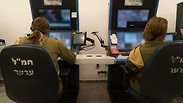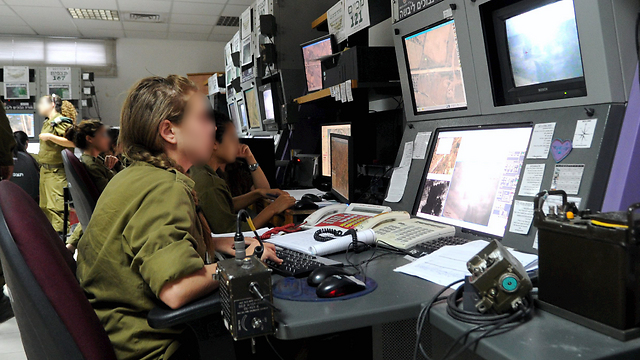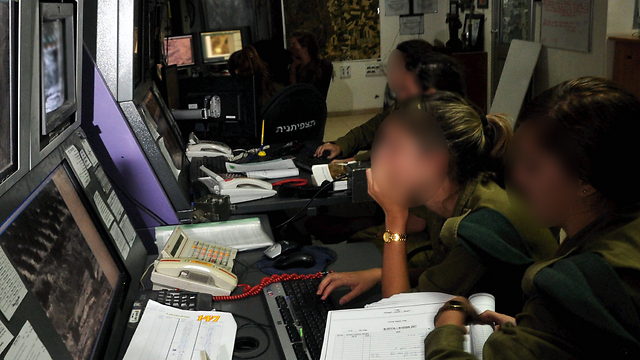
The eyes of the State of Israel
Opinion: The IDF has a team of women soldiers whose job it is to watch and monitor; known in Hebrew as tatzpitaniyot – derived from the word tatzpit, or lookout - these troops are often the first line of defense against terrorists, and their contribution cannot be overstated
It was at about this time, on July 17, 2014, the tenth day of Operation Protective Edge, that I sat in the Gaza Division's situation room as a reserve operations officer, barely managing to keep myself awake, waiting for my shift to end.
A ceasefire was supposed to come into effect the next morning and nothing of note had happened all night. A real end-of-year atmosphere prevailed.
Then, suddenly, the "Rose Mountain" - the encrypted cell phone - came to life, and out from it came the voice of a young woman, one of the soldiers from the Gaza Division's southern brigade on surveillance duty.
"Do you receive? Terrorists spotted coming out of the ground in the area of Kibbutz Sufa!"
In less than a minute we are in war mode. On one of the IDF's plasma screens, we can watch live everything the observer sees from her position, and what the rest of Israel's citizens will see the next day when the army releases video.
(Most of the soldiers who perform surveillance duty are women, and are called tatzpitaniyot – tatzpitanit in the singular - after the Hebrew word tatzpit, meaning observation point.)
We watch the screen and count the people emerging from the earth into Israel - three, four, six, 10 - when will it end? How many more terrorists will come in until someone stops them?
It continues until 13 terrorists – a considerable number – are standing at the tunnel opening.
Meanwhile, the division commander enters and begins issuing orders. Aircrafts are put in the air. Troops appear on the ground. Local residents are told to enter their protected areas.
Thanks to the vigilance of the tatzpitanit, a huge attack was averted, and the following day the cabinet authorized the IDF to begin its ground operation of the war, the results of which can be debated.
A different tatzpitanit, a week and a half earlier, identified a Hamas naval commando squad that landed on Zikim beach, and was taken out.
Tonight we salute Sgt. Y & hundreds of IDF soldiers who monitor Israel’s borders using cameras & other technology. Today she spotted 4 armed terrorists on their way to carry out a brutal terror attack in Israel.
— Israel Defense Forces (@IDF) August 10, 2019
Because of her they were stopped. And innocent lives were saved. pic.twitter.com/z4KnXvQciF
The same was true over the weekend, when Sergeant Y, a tatzpitanit in a situation room of the Gaza Division, identified the four terrorists who advanced toward the perimeter fence near the Gaza town of Deir al-Balah.
The sergeant directed guided the Golani troops on the ground towards them, surprised the four who were armed with Kalashnikov rifles and RPG launchers.
And it happened again the following day, when a tatzpitanit spotted an armed terrorist approaching the fence in the northern Gaza Strip and sent troops to intercept.
The IDF posts its tatzpitaniyot in every arena. It is a difficult task that involves sitting for hours in front of a screen, with few moments of glory. A tatzpitanit who fails to spot a terrorist due to a moment of lapsed concentration would have the consequences on her conscience forever.
A tatzpitanit who does thwart an attack will probably remain anonymous, just like Sergeant Y. So it is worth remembering that many Israeli citizens owe their lives to tatzpitaniyot, no less than elite fighters from Golani or Yamam.
This is also an opportunity to highlight what should be obvious but isn’t, in part because of rabbis and activists on a very specific side of the political map. The contribution of women soldiers to the security of the state and its citizens - and not just fighters – is no less than that of their male counterparts.
In fact, in many cases it is even greater.


















